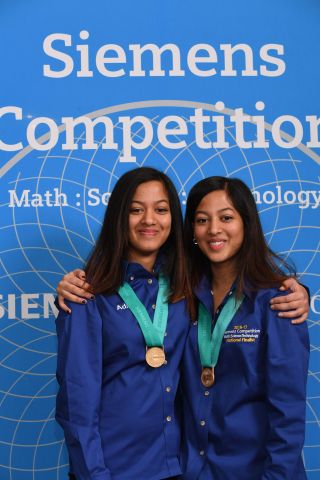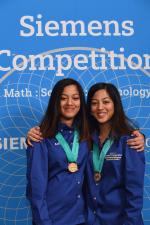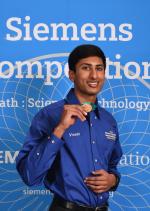Three high school students, one from Portland, OR, and a team from Richardson, TX, were awarded grand prizes of $100,000 scholarships for their significant accomplishments in scientific research in the 17th annual Siemens Competition in Math, Science & Technology. The Competition is the nation's premier science research competition for high school students and seeks to promote excellence by encouraging students to undertake individual or team research projects. For more information go to: www.siemens-foundation.org
This Smart News Release features multimedia. View the full release here: http://www.businesswire.com/news/home/20161206005984/en/

Twins Adhya and Shriya Beesam of Plano, TX, team winners of the 2016 Siemens Competition in Math, Science and Technology, will share a $100,000 scholarship. (Photo: Business Wire)
Vineet Edupuganti, a senior at Oregon Episcopal School in Portland, OR, won the $100,000 grand prize in the Individual category for developing a biodegradable battery that can power ingestible medical devices that can track and diagnose conditions that affect internal organs.
Identical twin sisters Adhya Beesam and Shriya Beesam, both juniors at Plano East Senior High School in Plano, TX shared the $100,000 grand prize in the Team category for their work developing a new approach to diagnose schizophrenia earlier in patients with higher certainty using both brain scans and psychiatric evaluations.
Bios, video, and photos available:
http://siemensusa.synapticdigital.com/US/Siemens-Foundation
“All of the judges, including myself, were very impressed that high school students – even juniors and sophomores – were able to produce such advanced research and with an extremely sound command of the science,” said lead judge Dr. Megan Leftwich, Assistant Professor in the Department of Mechanical and Aerospace Engineering at the George Washington University. “There was a real passion in what the students presented this year, as was shown by the depth of their research and by the relevance to what is actually being studied and valued in academia and society today. They looked at real problems today – and all tried to go a step further in their own journey and analysis. This was a very difficult group to have to choose a winner from.”
This year’s Siemens Competition winners, Vineet, Adhya and Shriya have demonstrated a drive and creativity that is truly awesome," said David Etzwiler, CEO of the Siemens Foundation. "These scholars are poised to transform the lives of millions around the globe by helping us advance medical knowledge and technologies designed to diagnose and treat various diseases. I cannot wait to see where their dedication and innovative thinking will lead them and the rest of us as well."
The 2016 Siemens Competition awards were presented at The George Washington University in Washington, DC, host of this year’s national finals event. 19 high school competitors – winnowed down from an original pool of more than 2,000 – were judged on their research in topics that addressed issues ranging from Alzheimer’s disease to levitating cars, and from cancer to planets outside our solar system. More than 1,600 projects were submitted for the competition this year in areas of computer science, physics, chemistry, mathematics, materials science, environmental science, biochemistry, biology, and engineering.
The Siemens Competition, launched in 1999 by the Siemens Foundation, was established to increase access to higher education for students who are gifted in STEM and is based on the culture of innovation, research and educational support that is the hallmark of Siemens. This competition, administered by Discovery Education, seeks to recognize and hopefully build a strong pipeline for the nation’s most promising scientists, engineers and mathematicians.
The Winning Individual
Vineet Edupuganti, a senior from Oregon Episcopal School in Portland, OR, won the individual category and a $100,000 scholarship for his project entitled, "Development of a High-Performance Biodegradable Battery for Transient Electronics."
Vineet’s work could simplify how medical practitioners diagnose conditions that affect internal organs. He developed a biodegradable battery that can power ingestible medical devices. The battery dissolves after the device has served its purpose, which means it can be swallowed without causing harm to the human body. This technology can be used to power medical devices that track and diagnose conditions that affect internal organs, like gastrointestinal disorders, which currently require complex imaging or invasive procedures to diagnose.
“This is very important technology, as implantable biocompatible devices play an increasingly important role in the future of medicine, as well as in environmental sensing with devices that themselves do not pollute the environment they are sensing, explained competition judge Dr. David Crouse, Professor and Chair of the Electrical and Computer Engineering Department at Clarkson University, in Potsdam, NY. “But current technology in this area is unreliable and poor performing. Vineet’s project doesn’t just incrementally improve upon current capabilities – it represents a truly transforming step in creating a device that is both degradable and compatible with the body. What was also remarkable about Vineet’s work was his comprehensive approach to single-minded tackling of the problem of biodegradable batteries: Not only did he come up with the idea, he chose the materials, conducted the research, and then engineered a practical and cost-effective device. Through this project, he exhibited the entire spectrum of skills, from innovation, through science, to engineering – and this impressed the judges greatly.”
Vineet is an aspiring entrepreneur who would like to find real-world applications for research that he can eventually take to market. He is fascinated by the newly-emerging field of biodegradable electronics because he sees its potential to affect change in a wide array of industries. Vineet received a third place grand award at the Intel International Science and Engineering Fair in 2015 and 2016. He plays classical piano, guitar and tennis.
Vineet’s mentor is Dr. Raj Solanki, Professor of Physics at Portland State University.
The Winning Team
Twin sisters Adhya and Shriya Beesam of Plano East Senior High School in Plano, TX, won the team category and will share a $100,000 scholarship for their project entitled, "Linked Neuro-Fuzzy Inference System: A Novel Approach to Schizophrenia Diagnosis.”
Adhya and Shriya dedicated themselves to research better ways to diagnose schizophrenia after watching an uncle struggle with mental illness and several misdiagnoses before being diagnosed with schizophrenia. Eventually, they lost their uncle to suicide. Driven by the desire to help others be more quickly diagnosed and access better mental health treatment earlier, they taught themselves about schizophrenia and methods of diagnosing this illness. The diagnosis of schizophrenia has historically been based largely on psychiatric evaluations—which are primarily based on observation and conversations—and ruling out other possible diagnoses. The development of tests, such as MRIs or CT scans have accelerated testing, but integrating these two approaches offered hope for faster, more accurate diagnosis.
Armed with this knowledge, they developed a computer program that would analyze the results of both quantitative (MRI) tests and qualitative tests (psychiatric evaluation by a professional, known as Positive and Negative Syndrome Scale – PANNS.) Adhya and Shriya combined an approach known as “fuzzy logic,” with another method known as “neural networks” to combine the information in the brain scans and psychiatric evaluations in an intelligent manner that results in remarkably accurate results.
“Without any mentors or special access, Adhya and Shriya Beesam showed extreme resourcefulness as they taught themselves the scientific literature related to Schizophrenia, clinical methods and machine learning algorithms,” said Badrinath Roysam, Professor and Chair at the Cullen College of Engineering’s Electrical & Computer Engineering Department at the University of Houston. “With little outside guidance, they tracked down relevant databases and found a way to challenge the traditional instinct of choosing an already-established singular path of diagnosis, and instead pursued a way to harness the combined power of two major and different tools of clinical diagnoses. In the end, they ended up developing a credible approach to earlier diagnosis of Schizophrenia that could enable treatment. This was student science driven by passion, curiosity, tenacity and courage.”
The Beesams’ approach also has the potential to improve the diagnosis of many other brain disorders and diseases, such as Alzheimer’s disease and multiple sclerosis. The Beesam sisters did not have an official mentor but had support from Julie Baker, a teacher in the Biology department at Plano East Senior High School.
National Finalists
Six individuals and six teams competed at the 2016 Siemens Competition National Finals. The remaining national finalists were awarded the following scholarships:
Individuals:
- $50,000 scholarship -- Manan Shah, Senior from The Harker School in San Jose, CA, resides in Los Altos
- $40,000 scholarship -- Alexander Kirov, Senior from Greenbrier High School in Evans, GA, resides in Evans
- $30,000 scholarship -- Prateek Kalakuntla, Senior from Texas Academy of Mathematics and Science in Denton, TX, resides in Plano
- $20,000 scholarship -- Pranav Sivakumar, Senior from the Illinois Mathematics and Science Academy in Aurora, IL, resides in Tower Lakes
- $10,000 scholarship -- Blake Hord, Senior from Dobbs Ferry High School, Dobbs Ferry, NY, resides in Dobbs Ferry
Teams:
- $50,000 scholarship -- Nikhil Cheerla, Senior at Monta Vista High School in Cupertino, CA, and Anika Cheerla, Sophomore at Monta Vista High School in Cupertino, CA, both residing in Cupertino
- $40,000 scholarship -- Yoshihiro Saito, Sophomore at Marriotts Ridge High School in Marriottsville, MD, residing in Ellicott City, MD, and Lauryn Wu, Sophomore at Thomas Jefferson High School for Science and Technology in Alexandria, VA, residing in McLean, VA
- $30,000 scholarship -- Louis Golowich, Junior at Lexington High School in Lexington, MA, residing in Lexington and Richard Zhou, Junior at Lexington High School residing in Lexington
- $20,000 scholarship -- Katherine Cao, Senior at Homestead High School in Mequon, WI, residing in Mequon, William Hu, Senior at Saratoga High School in Saratoga, CA, residing in Saratoga and Alice Wu, Senior at Half Hollow Hills High School West in Dix Hills, NY, residing in Dix Hills
- $10,000 scholarship -- Jasmin Gao, Senior at Northview High School in Johns Creek, GA., residing in Suwanee, GA, and Rose Hong, Junior at Del Norte High School in San Diego, CA, residing in San Diego
2016 Siemens Competition
- 2,146 students (1271 individuals, 304 2-person teams and 89 3-person teams) submitted applications from 46 states plus the District of Columbia and 7 countries with more than 1,600 projects submitted for consideration.
- 498 students were named Semifinalists from which 96 were named Regional Finalists
- 19 National Finalists were selected over three weekends in November, judged by esteemed scientific experts at six leading research universities which host the regional competitions: Georgia Institute of Technology and Massachusetts Institute of Technology (November 4-5), California Institute of Technology and University of Notre Dame (November 11-12), and Carnegie Mellon University and The University of Texas at Austin (November 18-19)
For more details go to: http://siemensusa.synapticdigital.com/US/Siemens-Foundation. Follow us on Twitter @sfoundation (#SiemensComp) and like us on Facebook at Siemens Foundation.
About the Siemens Foundation
The Siemens Foundation has invested more than $90 million in the United States to advance workforce development and education initiatives in science, technology, engineering and math. The Foundation’s mission is inspired by the culture of innovation, research and continuous learning that is the hallmark of Siemens’ companies. Together, the programs at the Siemens Foundation are helping close the opportunity gap for young people in the U.S. when it comes to STEM careers, and igniting and sustaining today’s STEM workforce and tomorrow’s scientists and engineers. For further information, visit www.siemens-foundation.org or follow @sfoundation.
About Discovery Education
Discovery Education is the global leader in standards-based digital content for K-12, transforming teaching and learning with award-winning digital textbooks, multimedia content, professional development, and the largest professional learning community of its kind. Serving 4.5 million educators and over 50 million students, Discovery Education’s services are in half of U.S. classrooms, 50 percent of all primary schools in the UK, and more than 50 countries. Discovery Education partners with districts, states and like-minded organizations to captivate students, empower teachers, and transform classrooms with customized solutions that increase academic achievement. Discovery Education is powered by Discovery Communications (NASDAQ: DISCA, DISCB, DISCK), the number one nonfiction media company in the world. Explore the future of education at www.discoveryeducation.com.
View source version on businesswire.com: http://www.businesswire.com/news/home/20161206005984/en/
Contacts:
Siemens
Elizabeth Cho, 917-622-2413
elizabeth.cho@siemens.com
or
Discovery
Education
Dara Klatt, 240-662-3043
Dara_Klatt@Discovery.com
or
Follow
us on Twitter @sfoundation (#SiemensComp)

